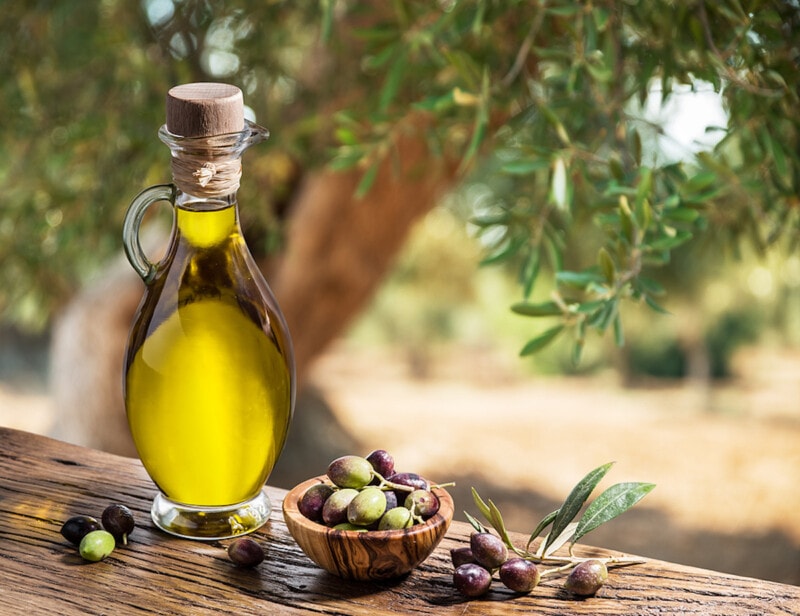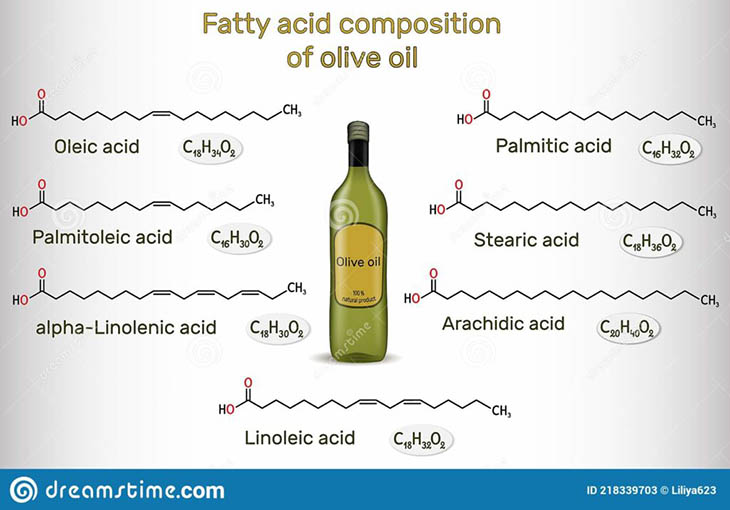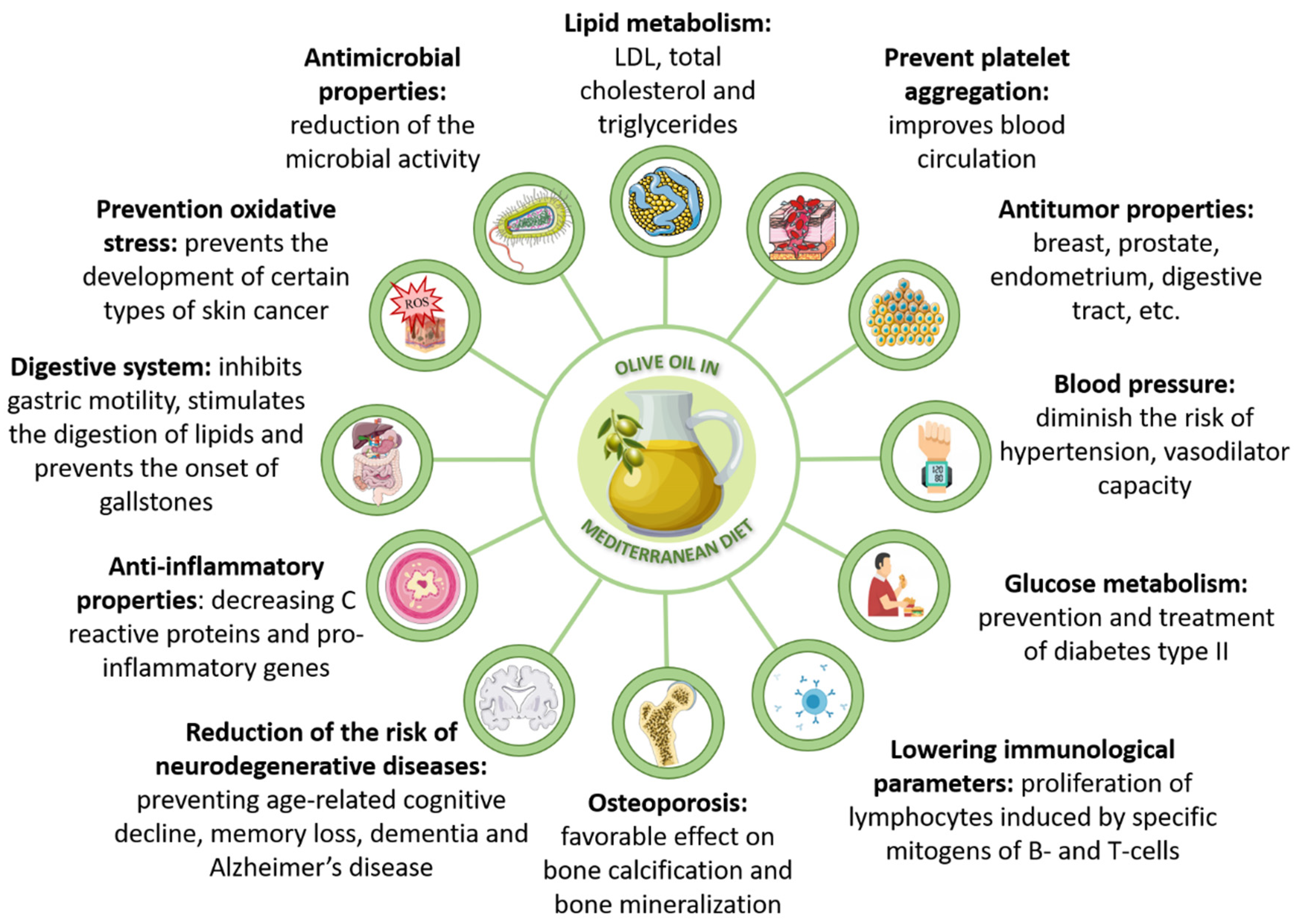
Special diets for special needs acknowledge the concept of bio-individuality, and the preference to mold food choices based on the signs, symptoms, goals, and health outcomes of each individual. One diet of particular interest is that of Mediterranean origin, otherwise known as the Mediterranean diet (MD). Such a method of eating is characterized by generous use of vegetables/fruits/whole grains, moderate intakes of fish/poultry/red wine, and liberal use of fats in the primary form of olive oil.1 In the following sections, this author would like to expound upon the value of olive oil, types, and benefits of including such an unsaturated fatty acid in the human diet.

Olive oil is predominantly characterized by long chain (i.e., 18 carbons long) monounsaturated (i.e., one double bond) fatty acids (i.e., has a carboxylic acid) otherwise known as oleic acid or an omega-9 (double bond on the 9th carbon) fatty acid.2 Olive oil has the capacity to inhibit foodborne pathogens as well as stimulating the proliferation of microorganisms such as B. bifidum and L. acidophilus that provide health benefits when consumed.3 Moreover, research has also indicated that olive oil intake can interact and influence the gut microbiota in animals, and humans.3(220) However, olive can be procured in different ways ultimately effecting its quality and impact upon individuals. As such, the following will explore the same.
Extra virgin olive oil (EVOO) characterizes an oil which contains the highest physiochemical quality characteristics defined by Mohsen et al3(221) as minimal free acidity and peroxide value, while virgin olive oil (VOO) exudes intermediate quality characteristics.3(221) Lastly, the lampante olive oil (LOO) is characterized by the low quality and must not be consumed before additional processing stage, particularly the refining step.3(221) Such differentiation in processing techniques is relevant because of the effects upon olive oil’s phenolic compounds, triterpenic dialcohols, polar pigments (pheophytins and chlorophylls), sterols, triterpenic alcohols, fatty alcohols, 4-methyl sterols, tocopherols, and hydrocarbons (i.e., squalene and the carotene β-carotene) and xanthophylls.3(221) Thus, EVOO is the form with the greatest levels of such compounds and an oil with the highest bioavailability.
The MD contains a generous amount of olive; levels which constitute as much as 25% of total calories from food, per day.3(223) Mohsen et al3(223) cited a research study whereby 20 obese individuals were recruited to monitor the gut microbiota composition and its relationship with their metabolome after one year. Two dietary approaches were implemented; one group followed a Mediterranean diet while the other group implemented a low-fat/high carbohydrate diet. After a year of consuming said diets, the Mediterranean diet group experienced a decrease in Prevotella (gram negative bacteria) genus and an increase in the Roseburia, Oscillospira genus and Parabacteroides distasonis.3(223)Therefore, such a diet might help remove pathogenic bacteria (i.e., Prevotella) from EVOO providing bactericidal effects.2(221)

Mohsen et al3(223) also suggested that EVOO may help prevent the risk of certain cancers. Such influence was thought to be related to the phenolic content of olive oil with particular emphasis upon tyrosol, oleocanthal, oleuropein, hydroxytyrosol, and oleuropein aglycone.3(223) Said compounds, especially oleocanthal, was shown to inhibit the growth of certain breast cancer cells: BT-474, MCF-7, and T-47D. Another phenolic compound, hydroxytyrosol, was found to induce apoptosis (cell death) and cell arrest in colon cancer cells as well as in papillary and follicular thyroid cancer cells. As such, EVOO may act as another means to help prevent, and control, the proliferation of cancer.
EVOO has also been shown to support cardiovascular health. Reactive oxygen species (ROS), a natural consequence from cellular respiration in the mitochondria, immune responses, and xenobiotic exposures, can have deleterious effects if left unchecked.4 EVOO, for example, has been shown to down-regulate NOX2; a component involved in inflammation and the pathogenesis of several inflammation-mediated diseases.3(224)4 Mohsen et al3(224) also stated that EVOO contained high amounts of vitamin E; another well-known anti-oxidant that can help manage levels and concentrations of ROS throughout the body.
Other cardiovascular benefits associated with EVOO, as part the MD, included reduced glucose, and low-density lipoprotein cholesterol (potentially atherogenic), and reductions in systolic blood pressure.3(224, 225) Mechanisms behind such changes were thought to derive from direct influence upon the down-regulating of gene expression; miR-146b-5p (associated with atherosclerotic plaques) and miR-769–5p and miR-192–5p (related/associated with reduced glucose metabolism, fat accumulation on the liver, and acute myocardial infarction).3(225) Ultimately, such evidence helps support the inclusion of EVOO in diets due to its influence upon key health markers.
In conclusion, special diets for special needs acknowledge the concept of bio-individuality, and the preference to mold food choices based on the signs, symptoms, goals, and health outcomes of each individual. Olive oil, especially in the form of EVOO, has the capacity to confer several health benefits upon individuals who choose to incorporate such an oil in their daily diets. When combined with a larger, more robust approach (i.e., optimal sleep, exercise, reduction of processed foods), such an intervention is likely to foster and sustain lasting improvements in health, performance, and longevity.
References
1. Granado-Casas M, Alcubierre N, Martin M, et al. Improved adherence to Mediterranean diet in adults with type 1 diabetes mellitus. Eur J Nutr. 2019;58(6):2271-2279. doi: https://doi.org/10.1007/s00394-018-1777-z.
2. Lord RS, Bralley, JA. Laboratory Evaluations for Integrative and Functional Medicine. 2 nd ed. Duluth, GA: Genova Diagnostics; 2012.
3. Mohsen G, Khaneghah AM, Lorenzo JM, et al. Health benefits of olive oil and its components: Impacts on gut microbiota, antioxidant activities, and prevention of non-communicable diseases. Trends in Food Science and Technology. 2019;88:220-227. doi: 10.1016/j.tifs.2019.03.008.
4. Diebold BA, Smith SME, Lambeth JD. NOX2 as a target for drug development: Implications indications, possible complications, and progress. Antioxid Redox Signal. 2015;23(5):375-405. doi:10.1089/ars.2014.5862.
-Michael McIsaac




